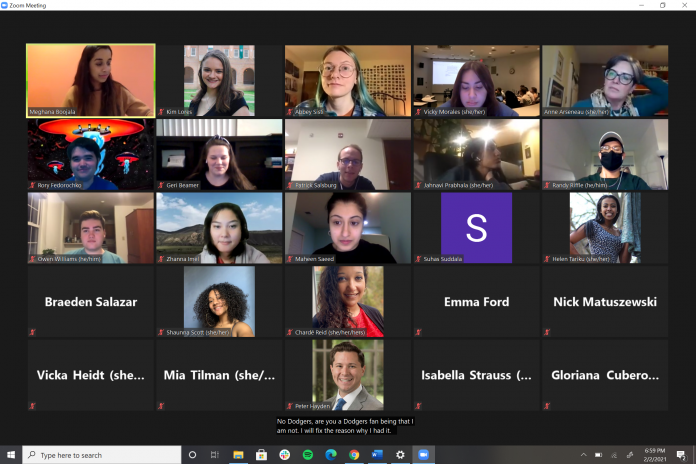Tuesday, Feb. 2, the College of William and Mary’s Student Assembly hosted Dean of Faculty of Arts and Sciences Maria Donoghue Velleca to discuss ambiguity surrounding the contracts of non-tenure employees at the College.
Due to financial constraints brought on by the COVID-19 pandemic, the College informed each of the university’s different schools that for fiscal year 2022, all academic programs must reduce their budget by 5%.These cuts originate from the College’s current budget deficit of $40 million during FY21.
Arts and Sciences, the university’s largest school, has a budget of around $80 million. A 5% budget reduction requires cutting over $4 million in spending. According to Velleca, 97% of the Arts and Science budget goes towards faculty and staff salaries, meaning that a 5% budget cut must affect staff salaries and employment in some form.
“There have been times in my career that I just remember times of heartache, and this is absolutely one of those for me,” Velleca said.
Velleca began her presentation breaking down the different faculty under the Arts and Science umbrella, including around 400 tenure or tenure-eligible faculty and 100 non-tenure eligible faculty.
Within the first category, tenured faculty hold their position for life or until retirement while tenure-eligible faculty receive two, three-year contracts with the College. If tenure-eligible faculty complete both those contract periods with high remarks, they are accepted onto a path toward tenure.
Velleca explained that these guidelines necessitate all salary-based cuts needed to come from NTE staff, who instead sign a year-to-year contract with the College. Of those 100 NTE staff, around 50 had their contracts end for this fiscal year with 34 receiving contracts again, 12 being told they were unsure if their contract could be renewed and the remaining faculty being told their contracts would not be renewed with the College.
“If there’s any way we can avoid across the board personnel action, so that is, salary reductions or furloughs, that’s what people really want to do, because that can be super destabilizing,” Velleca said.
The decisions regarding which faculty contracts to renew were made based upon many factors, including student interest, unique skill sets, their involvement in teaching the COLL curriculum and interdisciplinary programs, resources available to their departments and diversity, both in personal backgrounds and their areas of study.
Velleca added that cuts to other aspects of the Arts and Science budget were exhausted before looking at salaries, such as reducing any new faculty hires from the usual 20 to only one, a $1.4 million decrease, as well as reducing their MNO budget by 30% that covers any office expenses. Additionally, Velleca explained that recent, unexpected retirements opened the budget to all contracts to more of the NTE faculty waiting to hear their employment status.
Velleca then discussed the options for Arts and Sciences students for this semester regarding pass/fail. Currently, the College is operating under the standard pass/fail policy, in which junior and senior students can take one normally-graded class as pass/fail, so long as those classes do not fill major/minor or COLL requirements. Some students have advocated for a return to last semester’s pass/fail policy, which allowed students across the College to take any two classes on a pass/fail basis.
Velleca expressed her concern with this approach, saying that students who choose to take a class pass/fail now may not realize how that decision could impact future applications for law school, medical school or internships. However, she welcomed discussion about the future of pass/fail options for this semester and encouraged students to reach out to her.
Later in the meeting, Senate Chair Meghana Boojala ’22 introduced the Naming & Renaming Referendum Act, which would authorize a referendum regarding the naming and renaming of future campus spaces, buildings and iconography. The referendum will ask students to identify a balance between “glorification and representation.” This referendum follows the College’s creation of a working group tasked with a similar purpose last June.
Currently, the bill includes a suggested preamble for the referendum that discusses the Founding Fathers’ valuable contributions to our nation as well as their views on “race, gender, and sexuality” that have been ingrained into our national institutions and cause “violence and turmoil” today.
The referendum will include questions regarding whether there should be a cap on the number of spaces or awards named after one individual, if that cap should apply to the Founding Fathers and if spaces and awards currently named after Founding Fathers should be included in the naming/renaming evaluation. The referendum also includes a question about whether the name of a space or award should commemorate an individual or their actions.
The bill will be sent to committees for discussion this week, where senators will discuss the language and wording of the preamble and questions. It will be voted on by the Senate next week.
Also at this week’s meeting:
- Geri Beamer M.Ed. ’21 and Abbey Sisti Ph.D. ‘22 were confirmed as the new senators for the School of Education and Virginia Institute of Marine Science, respectively.

